Skovshoved Møbelfabrik’s OGK daybed dates back to 1962 when Ole Gjerløv-Knudsen created a bed suitable for a camping trip so that his son with a cold wouldn’t have to sleep on the ground. The portable daybed comes in a linen bag with a convenient shoulder strap, and it’s fast and easy to assemble – no screws or tools are needed. The simple frame is made of beech and the cover is durable linen. The twisted sisal ropes are an essential part of the structure and double as a beautiful detail. The OGK daybed is a delightful classic, great as a guest bed and for lounging both indoors and outdoors.
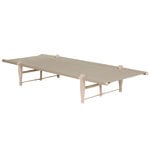
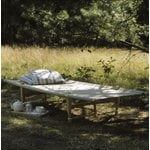

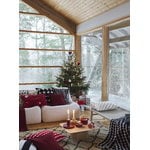
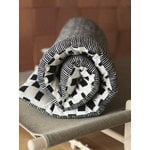
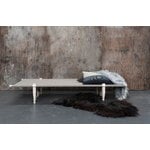
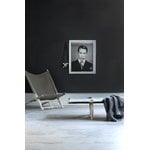
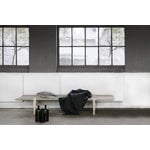
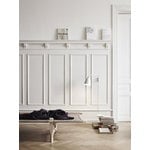
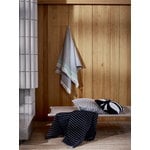
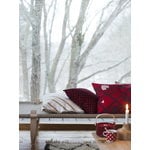
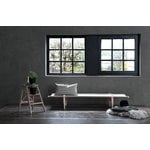
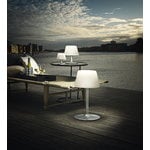
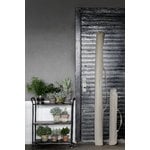
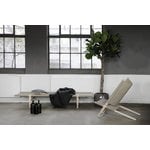
OGK daybed, beech - linen
Skovshoved Møbelfabrik
Description
Skovshoved Møbelfabrik’s OGK daybed dates back to 1962 when Ole Gjerløv-Knudsen created a bed suitable for a camping trip so that his son with a cold wouldn’t have to sleep on the ground. The portable daybed comes in a linen bag with a convenient shoulder strap, and it’s fast and easy to assemble – no screws or tools are needed. The simple frame is made of beech and the cover is durable linen. The twisted sisal ropes are an essential part of the structure and double as a beautiful detail. The OGK daybed is a delightful classic, great as a guest bed and for lounging both indoors and outdoors.
Product details (6)
- Colour
- Beech, natural linen
- Material
- Beech, linen, sisal
- Length
- 200 cm
- Width
- 80 cm
- Height
- 35 cm
- Frame material
- Beech
- Product ID
Designer
Ole Gjerløv-Knudsen (1930–2009) was a productive Danish designer, well known for his OGK daybed safari chair as well as the Modeline collection, which he designed together with Tørben Lind. After finishing his training as a cabinetmaker, Gjerløv-Knudsen studied furniture design in the Danish School of Arts and Crafts and architecture in The Royal Danish Academy of Fine Arts. Later on he taught in the Danish School of Arts and Crafts’ School of Architecture and worked as the principle of his alma mater from 1967 to 1990.
View all productsReviews (2)
4
Based on 2 reviews
-
A
anonyymi
Oulu, Finland
Vähän on ehkä hutera eikä välttämättä tule siihen käyttöön mihin halusin.
400 days ago
-
A
Anonym
149 days ago
Sustainability
The Product Sustainability Framework, our criteria of sustainable design, helps you find the most sustainable products in our selection. Read below which sustainability criteria this product has met.
Working conditions & labour 6/9
-
Equal opportunities for all employees
-
Commitment to UN Global Compact, fair compensation for all employees
-
Corporate responsibility requirements defined and communicated for suppliers
-
Systematic work for improved inclusion and well-being in the workplace
-
Transparent supply chain
-
Suppliers' compliance to a code of conduct ensured
-
Direct suppliers audited and certified
-
Compliance to the UN Guiding Principles on Business and Human Rights ensured in the supply chain
-
Support for community involvement in the supply chain
Eco-friendly production 8/9
-
Fair and resource-wise water-use in production
-
No incineration or landfilling of returned items
-
No use of endangered species as materials
-
No direct environmental emissions or waste (excl. GHGs) from production
-
The sustainability of direct suppliers' production is addressed and monitored
-
Production and material sourcing that respect biodiversity, animal rights, and natural ecosystems
-
Material-efficient and ecological packaging
-
No potentially harmful chemicals used in own production
-
Positive impact on nature’s well-being through operations that regenerate natural ecosystems
Climate impact 3/8
-
Company's direct greenhouse gas emissions identified and commitment to reduction
-
Product's carbon impact identified and commitment to reduction
-
Guidance on energy- and eco-efficient use of the product
-
Contribution to climate initiatives beyond the brand’s direct operations
-
Low-carbon or compensated transportation
-
Carbon footprint of the product calculated and goals set to reduce it
-
100 % renewable energy in own production and operations
-
Carbon neutral or carbon negative product
Sustainable materials 6/6
-
Sustainable and long-lasting material choices
-
No harmful or hazardous substances
-
Responsible raw material sourcing and production
-
Materials suited for circularity: monomaterials, recyclable finishings, renewable or recycled contents etc.
-
Ecological materials: natural, biodegradable, recyclable or recycled contents
-
Outstanding materials in terms of innovativeness, responsibility, sustainability and circularity: local production or sourcing, 100 % recycled content, C2C-certification etc.
Circular design 4/5
-
High aesthetic quality promoting long-term use of the product
-
Technically durable product design and material choices
-
Design for enduring life-long quality
-
Design and support for product maintenance, repair and upgradability
-
Innovative circular design solutions: circular service system, resale platform, remanufacturing, collection of used products, etc.

















